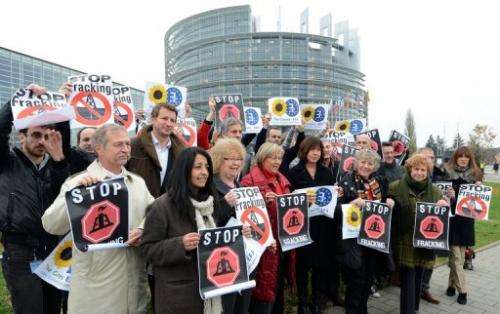Members of the Greens/European Free Alliance group of the European Parliament hold banners reading, "Stop fracking" in Strasbourg, eastern France, on November 21, 2012. The European Union has no plans to impose a blanket ban on hydraulic fracturing, a controversial shale gas extraction method, but it will lay out rules to address environmental concerns, a top EU official said Tuesday.
The European Union has no plans to impose a blanket ban on hydraulic fracturing, a controversial shale gas extraction method, but it will lay out rules to address environmental concerns, a top EU official said Tuesday.
EU Environment chief Janez Potocnik said the European Commission, the bloc's executive arm, will draft its proposal for the rules by the end of the year to settle "some serious legislative gaps".
"We don't talk about banning fracking at the EU level," he told AFP after discussing the issue with the bloc's environment ministers in the Lithuanian capital Vilnius.
But he said they plan to ensure hydraulic fracturing or fracking is "done in a safe and secure way".
The EU's 28 members are divided in their approach to fracking. Poland, for example, has enthusiastically granted exploration rights to US fuel giants while France has banned the method.
Fracking involves using huge amounts of pressurised water mixed with chemicals to crack open shale—sedimentary rock containing hydrocarbons—to release natural gas.
Environmentalists have raised the alarm that the chemical-laced waste could be contaminating fresh water resources.
Despite the risks, a shale gas boom in the United States has seen gas prices drop, helping to fuel an economic comeback and shake up the petrochemical industry worldwide.
Potocnik said Brussels was still debating whether the proposals on fracking would include new legislation or simply guidelines "to explain how existing legislation should be used".
Lithuanian Environment Minister Valentinas Mazuronis, who chaired the talks, said there was no common position among member states about the planned EU-wide regulations.
Some members want blanket rules, while others prefer sticking to national legislation.
Lithuania took over the rotating half-year EU presidency on July 1.
© 2013 AFP
























